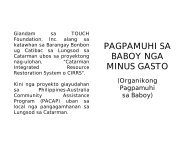2011 Annual Report - PhilDHRRA-Mindanao
2011 Annual Report - PhilDHRRA-Mindanao
2011 Annual Report - PhilDHRRA-Mindanao
Create successful ePaper yourself
Turn your PDF publications into a flip-book with our unique Google optimized e-Paper software.
Palo Para sa Bantay-Gubat, Gully Tree Planting,<br />
Alay Para sa Bantay Gubat and Support for the<br />
Multi-sectoral Forest Protection Committee<br />
(MFPC) and the MMPL-PAMB.<br />
The Livelihood Enhancement and Enterprise<br />
Development Program aims to increase the<br />
income of target communities by helping improve<br />
their productivity through the adoption of<br />
environmentally-sound utilization and<br />
management of local resources. Projects under<br />
this program include the Sumbakil PEACE<br />
Project and Botika ng Bayan.<br />
The Cooperative Development and Institution-<br />
Building Program is designed to help build<br />
people's competence and confidence in their<br />
chosen field of endeavour. Under this program,<br />
Mahintana currently implements the T'boli<br />
Cooperative Development Project and the<br />
Maasim Integrated Area Development Program.<br />
The foundation's undertakings under its Basic<br />
Social Services Program are mostly related to<br />
the provision of health care and education<br />
services. The activities under this program are<br />
usually conducted in partnership with the Local<br />
Government Units (LGUs) and other private<br />
sectors operating the identified communities.<br />
The projects under this program are: South-<br />
Eastern Philippines Health and Economic<br />
Alternatives (HEAL) Project, Adopt-A-School<br />
Project, ComDev Project (which includes other<br />
reciprocating projects such as Chairs for Trees,<br />
Books for Trees, etc.), Grassroots Initiatives for<br />
Peace (GrIP) Project, Polomolok Task Force<br />
Kalusugan, and Kapit Bisig Para sa Kabataan<br />
Program.<br />
A major initiative under MICADEV were the<br />
Enhancing Community Investment on Trees<br />
andEnvironment (ECITE) Projects I & II which<br />
was completed in August 2008. The projects<br />
were initiated as part of the reforestation<br />
initiatives along the Buffer Zone communities of<br />
the Mount Matutum Protected Landscape<br />
(MMPL). ECITE Projects facilitated the<br />
establishment of a total of 393.2 hectares of<br />
Agro-forestry and 320 hectares of Reforestation<br />
areas along the Buffer and Multiple Use zones of<br />
the MMPL.<br />
Mahintana considers the setting-up of a<br />
functional PAMB and MFPC for the MMPL as<br />
one singular achievement that the concerted<br />
effort of the stakeholders of Mt. Matutum<br />
through the MICADEV.<br />
44<br />
A major challenge of the PAMB which now<br />
administratively supervises the programs and<br />
activities of MICADEV is how it can assure the<br />
security of tenure of qualified protected area<br />
occupants. Further, it will have to sustain the<br />
collective efforts of the MICADEV players,<br />
maintain the planted trees, continue its vigilance<br />
against poachers and encroachers, up-scale the<br />
community's livelihood enterprises, and nurture<br />
community organizations.<br />
Nonetheless, while the battle will continue to be<br />
uphill, the incline, however, may not anymore be<br />
as steep as it was before. There are ground-level<br />
indications that the relentless campaign to<br />
awaken people's concern for environmental<br />
nurturance is beginning to bear fruits. In Purok<br />
Ocho, a village that is probably farthest from<br />
civilization as it is closest to the top of Mt.<br />
Matutum, Bong Mara Buan, the village chieftain,<br />
has issued a couple of kitabs, B'laan tribal<br />
ordinances, that are supportive of the<br />
environmental campaign. Bong Mara Buan has<br />
prohibited the killing of the civet cat on pain of<br />
banishment from the tribe for those caught<br />
violating the kitab. Also, only those who plant<br />
coffee will be allowed to pick droppings of the<br />
civet cat from the coffee farm of the tribe.<br />
Mahintana, itself, lists the following as the<br />
challenges in the years ahead: the acquisition of<br />
technical and scientific monitoring tools,<br />
sustainability of initiatives and of organized<br />
communities, official and continuing funding<br />
support for the Protected Area Security Units<br />
(PASU), and the issuance of tenurial<br />
instruments.



